Lessons in Love Learned from the Homeless

I was not participating in a field trip to find out about homelessness. I was trying to find myself. And, I think I did.
In 2003, I went on a Street Retreat with a small group. It was the first such event in Austin, Texas. We were dropped off downtown with no money, no credit cards, and no cell phones. For 72 hours, we tried to find our way in this new world.
Where to eat? Where to sleep? Where to use the bathroom? Whom to fear? Whom to trust?
These 72 hours changed my life. I was a professional, the head of a school. I had a wallet, a bank account, and a house. I had people who loved me.
But, on the streets, I was shaken. There was so much pain, so much wrong with what I was witnessing.
Yet, people were kind to me. The same people who slept on cardboard, smelled of urine, and dumpster-dived for food, knew I need to be shepherded. I was an innocent lamb in their world.
The homeless taught me so many lessons. And showed me so much love.
Thanks to those living in the streets, I learned where to get food in the various church soup kitchens.
I learned where there was a forgotten water faucet in an abandoned garage to fill my cup.
I learned where to sleep where the rats wouldn’t scurry.
I learned not to take my backpack and blanket into the library and be denied access.
I learned not to jaywalk to avoid getting a ticket.
I learned to be a receiver, not a giver when a homeless man said, “You look thirsty,” and spent his last dollar to get me an ice tea at a corner convenience store.
So I went back to the streets again and again.
Sometimes for 72 hours, sometimes for a weekend, sometimes for a day, seeing people I knew, and people I wanted to know. My life continued on its usual professional and personal path; nevertheless, my street life never stopped.
Since that first retreat in 2003, I have embraced the homeless community week by week, year by year. Still learning how to give and receive. Still learning from homeless people who have enriched my life beyond measure.
Still hoping to return the favor in some small way and shepherd them a bit.
I have favorite places and people to check on.
One homeless camp under a highway, is five minutes from my house. I go there frequently and know many of the homeless people who live there.
Recently, I thought of two friends and worried. The rain soaked us for weeks and I thought of the men, Mark and Rick, huddled in damp shirts under the overpass. I headed to Thrift Town in the continuous drizzle and bought two shirts for seven dollars—short-sleeved for Mark and long-sleeved for Rick.
Parking in the bank building along the strip, I grabbed my umbrella, crossed the crazy busy street with the aid of the walk light and began to head the long blocks to where I knew they hung out.
Rick saw me coming and rolled his wheelchair to meet me part way. He was so happy to see me and the first words he said were: “Give me a hug.” This was the only time he had ever spoken these words during our 10-plus-year friendship.
After a heartfelt hug, I gave Rick his shirt, which he loved—I am beginning to understand his taste—and five dollars. He went searching for his wallet to secure the money and midway, his unsheathed eight-inch knife nearly fell from his lap. He said, “I have to protect myself; I can’t go running after the bad guys.” And indeed he can’t. Rick has no legs at all. He is a torso, a neck, a head, and arms.
On this visit I experienced another first:
Rick finally admitted he couldn't survive another winter living on the streets.
I agreed and said, “Rick, you are too old to be on the streets.” How old are you, actually?” He told me he was born on September 3, 1964. I have two sons who straddle his age, yet they appear younger.
Rick’s face looks like old leather, wrinkled and brown, from a life lived outside. His eyes are bloodshot from drink and drugs. His hands are dirty with calluses and cracked skin from turning the wheels on his wheelchair through paved streets and the gravel stretches of his home under the overpass.
When I first knew him, he had one leg. Now none. When I first knew him, he was aloof, resisted help, and proud of his independence. Now he is realistic, resigned, and reachable. What must I do? He is my friend.
A poem in loving honor of my homeless brother:
I know his crooked neck and legless body, a mere torso moved by thin muscled arms
I know his hands, calloused with dirt under the nails and his shy smile that spreads when he sees me
I know his eyes, bloodshot and wary through which he sees the world
I know his clothing preferences: underwear briefs and long-sleeve dark shirts
I know his eyeglass magnification: 2.0 to read his pocket-sized New Testament
I know his food and drink choices: plain hamburger if asked, and a big beer for breakfast
I know his music and the smokes he loves: Coldplay rock band and cheap Supreme Cigarillos
I know the weapon he hides under a lap blanket: an eight-inch fixed-blade knife
I know the cell phone in his shirt pocket (that always needs charging)
I know the detailed drawings he creates when he is alone and has paper and pen
I know his birthday: September 3, 1964
I know the monster that has its claws in him: Heroin
I don’t know the family he left behind decades ago (parents, aunts, uncles, a spouse, siblings)
I don’t know his education or jobs held
I don’t know why he curses people out and shouts obscenities (but not to me)
I don’t know why he will not leave the square mile of his homeless home under a bypass with tunnel-like winds and littered trash
I don’t know why days after we shared a pepperoni pizza and said our usual farewells—
“I love you”, “I love you too,”
Rick took his life.
Rick Garcia: Rest in Peace.

Photo Credit: ©GettyImages/Akulinina
Originally published October 09, 2019.




